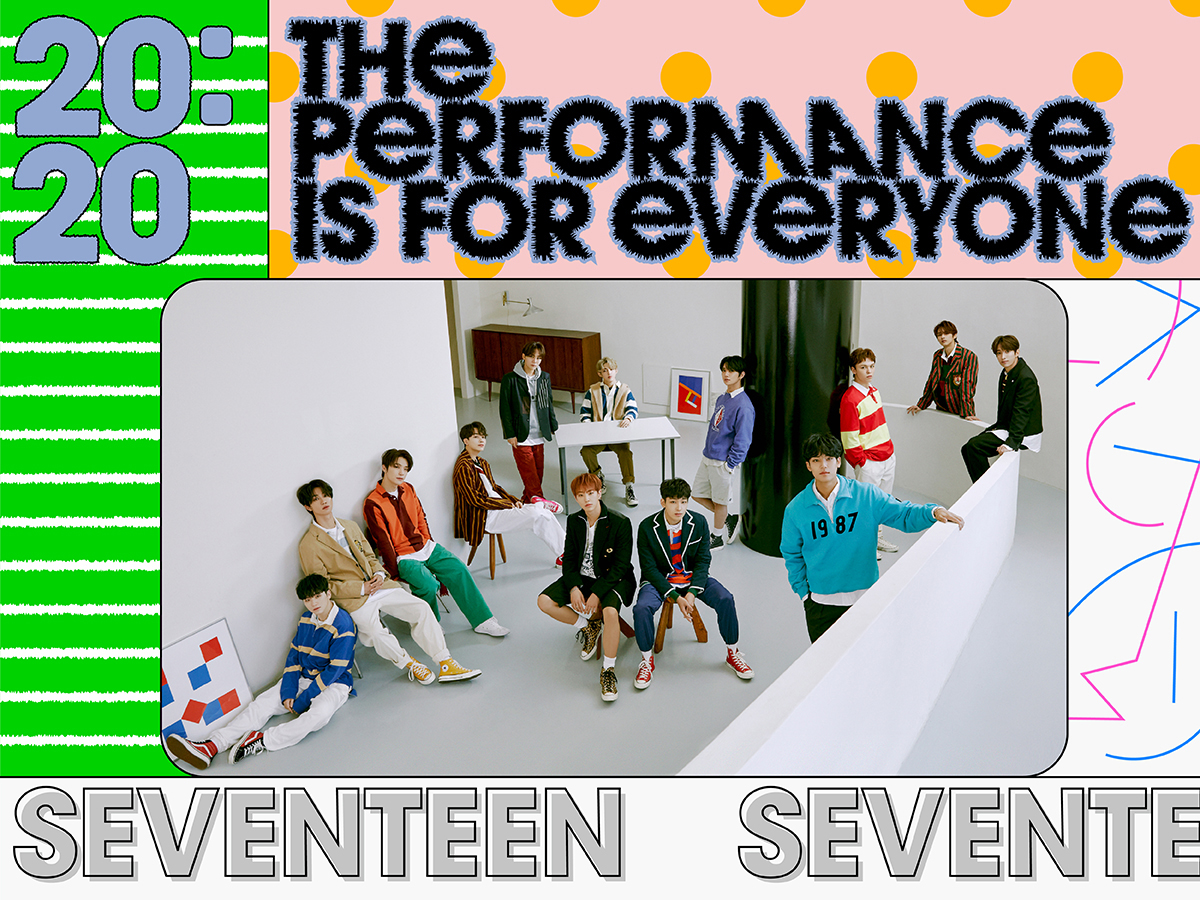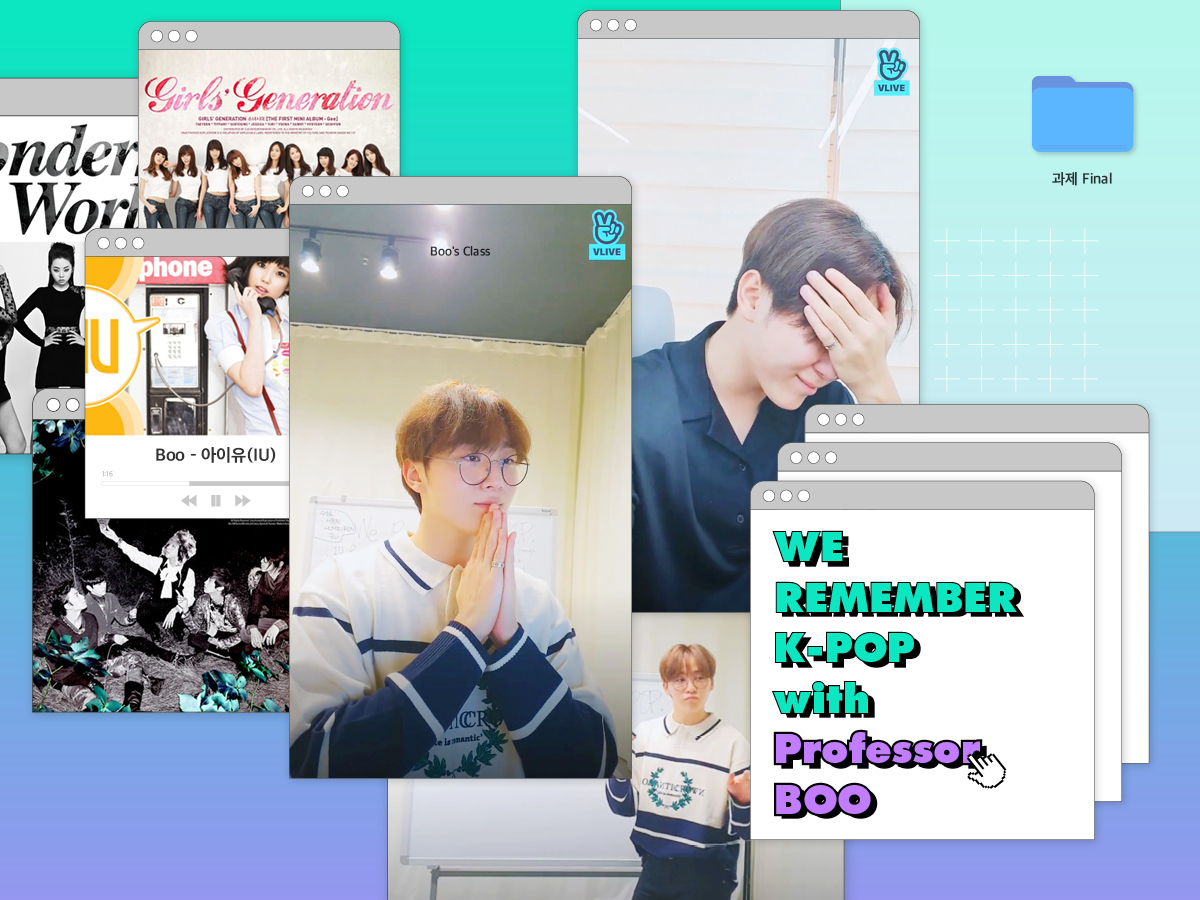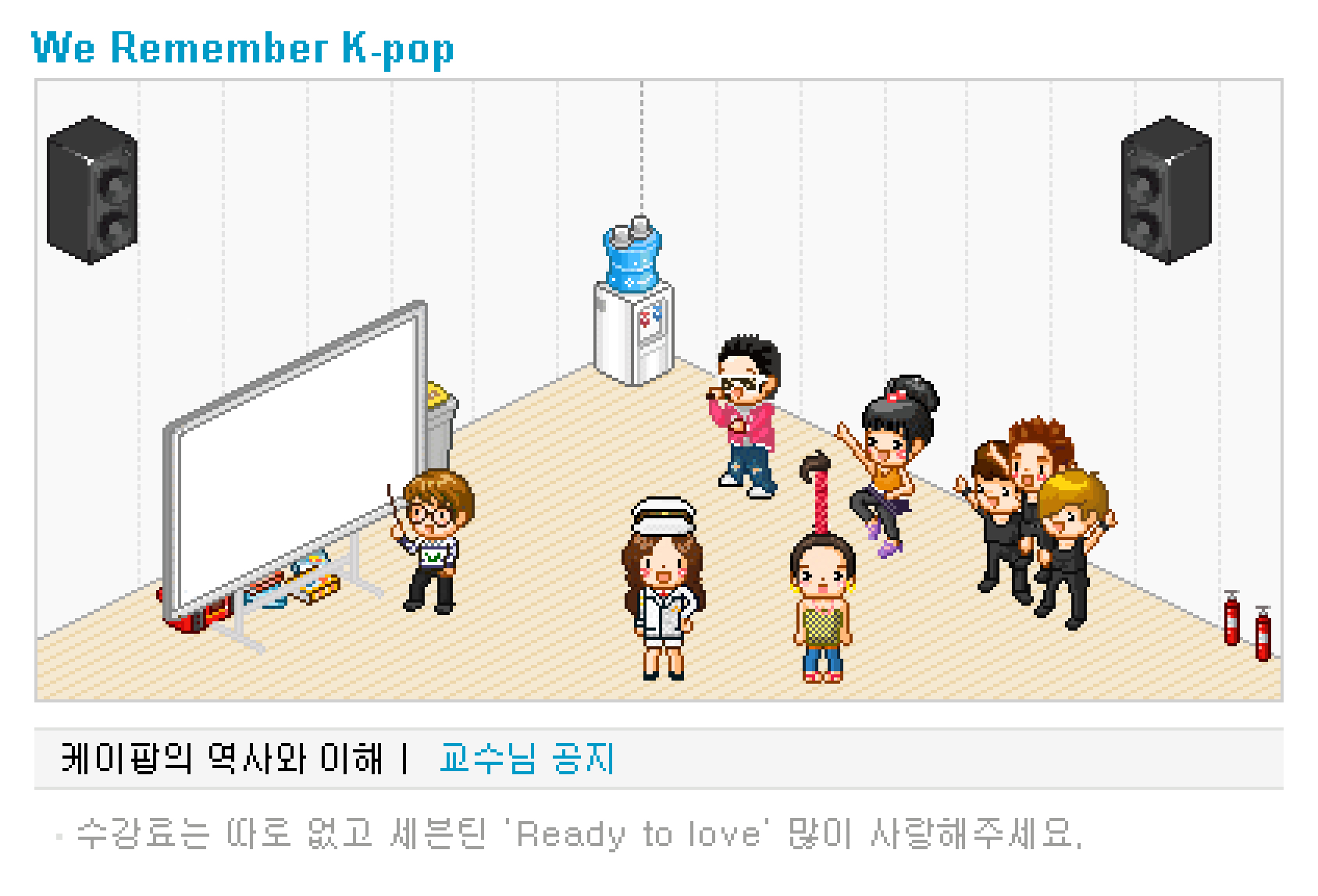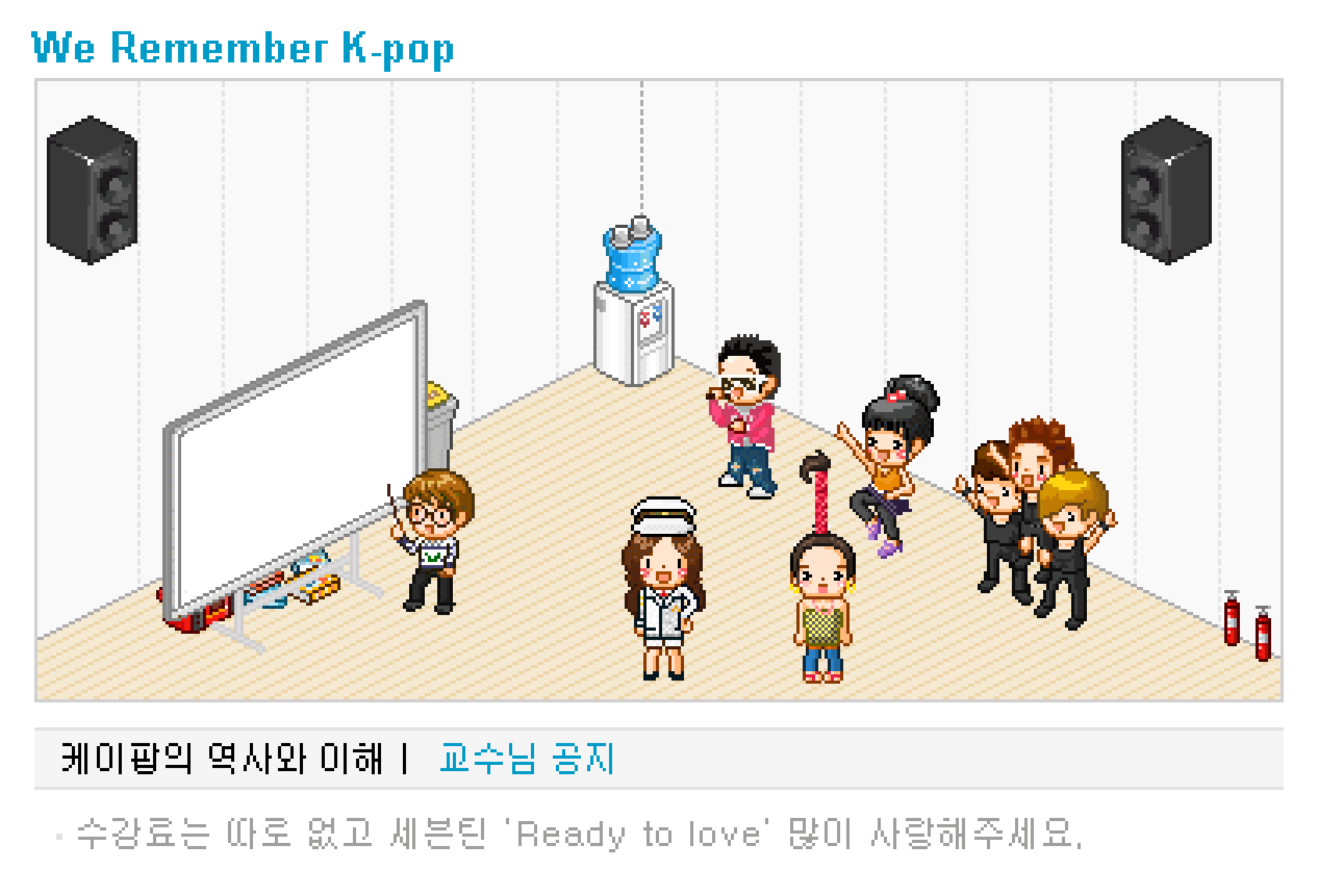
FEATURE
We Remember K-pop, Uncovering the Memories of the 1990s Kids
K-POP of the 1990s Kids - From The Best Hidden Songs to Professor Boo’s Lectures
2021.06.15
Hoyeon, a member of an idol group fandom, recalled how they came to know about We Remember K-pop, a series of V LIVEs by SEVENTEEN member SEUNGKWAN, otherwise known as Professor Boo: “I found out from a retweet from a friend who’s FUSE, the ONF fandom, and when a friend in THE B, THE BOYZ’s fandom, mentioned it.” We Remember K-pop came about last May during SEUNGKWAN’s V LIVE “CARAT Who Wants To See Me Sing, Come,” where he sang along to songs for CARAT, his group’s fanbase. At some point SEUNGKWAN, who had mostly been singing ballads, started to play songs he wanted to hear too: late 2000s to early 2010s K-pop, from his school days. SEUNGKWAN was overtaken with memories as he sang along to selected songs and discussed music appreciation, and as viewers posted to social media about how fun it was watching him share his favorite songs, word started to get around to other fanbases in no time. These K-pop fans flocked to the stream, and it became a space to talk about the songs and idols they used to love. From September, SEUNGKWAN started to spread his love of K-pop regularly on We Remember K-pop, selecting K-pop songs from 10-odd years ago to play and passionately covering memories from and information about the era’s songs, at which point idol fans began to refer to him as Professor Boo.
Twitter user kpop_choochun, who shares various K-pop videos, trended as Professor Boo’s so-called “cheat sheet account,” the reason being that the songs SEUNGKWAN mentioned on V LIVE often overlapped with those that had been posted by kpop_choochun. “I went to school around 2010, so when I listen to those songs, certain memories come back to me,” the owner of the kpop_choochun account said. “When I meet my old school friends, we always end up talking about the music from back then.” Their taste in music overlaps with SEUNGKWAN’s because they went to school around the same time. In an interview with Weverse Magazine, SEUNGKWAN said that he would talk about “which group would place first in that week’s music shows whenever I met up with my friends who were into idols at afterschool classes.” K-pop was a frequent topic of conversation for teenagers. TV was still influential in the early 2010s, when people were only just beginning to consume content through smartphones, and popular idols appeared on talk shows like SBS’ Strong Heart every week. Going back a little further, user created content became a symbol of a new media landscape, with videos of users recreating the dances and catchy hooks from songs like Wonder Girls’ “Tell Me” captivating people of all ages. Twitter user kpop_choochun remembers the years “after 2008 as a kind of K-pop golden age” for this reason. It’s no exaggeration to say that, for those in their 20s today whose school days were during that so-called golden age, K-pop was a part of everyday life, one to be listened to together and discussed no matter what. “At a talent show,” SEUNGKWAN said on V LIVE, “eight teams did ‘Gee,’ one class did ‘Way to Go,’ and one team did ‘8282.’ ”
Every generation looks back fondly upon the music of their school days. In 2010, MBC’s Come to Play sparked the C’est si bon craze that brought the folk music of the 1970s and ’80s back into the spotlight; Infinite Challenge, on the same network, rounded up the first-generation idols of the 1990s on Saturday! Saturday is for Singers. Since then, JTBC launched Sugar Man, a program that tracks down singers who were famous in the 1990s and early 2000s but who haven’t been active since and whose recent goings-on were a mystery. The show remained popular into its third season in 2019. Two of YouTube channel MMTG’s video series—The Best Hidden Songs, uploaded since late 2018, and, more recently, Great Songs That Should Make a Comeback—seem to be an extension of this trend. However, MMTG uses these projects, which resurface songs that weren’t very popular at the time of their release, to look at K-pop in a way different from comparable TV programs. MMTG’s projects, We Remember K-pop and kpop_choochun all show people born in the 1990s reminiscing about K-pop and were born out of media like YouTube, V LIVE, and Twitter that exist outside the realm of TV—not only because the media environment of the 2020s is at the point where YouTube and other Internet media have grown to become the de facto mainstream, but also because it’s people who were born in the 1990s who are creating the content. According to MMTG producer Hong Minji, “Great Songs is a project that started from an email from a subscriber.” Hong explained the attitude she takes toward their projects: “This is our culture, you know? It comes natural to us.” What’s important to MMTG’s production, she said, is that it’s people born in the 1990s who are the new media content creators and also the arbiters of the subject matter. “Since our team members were born in the 1990s and are also the stars of the channel, we wouldn’t be able to talk about our own generation from a third-person, omniscient-like perspective.”
In addition to Hidden Songs and Great Songs, MMTG also visited Guiyeoni—the famous writer of the Internet novels that swept teenagers away in the early 2000s—and the voice actor behind the “quitting my job” meme that you may have seen, which has been viral for years. MMTG has worked tirelessly to uncover the cultural experiences of people born in the 1990s who have been forgotten by mass media—or, rather, old media—like TV, and to grant new meaning to them from today’s perspective. Hidden Songs and Great Songs are, arguably, a part of this endeavor: reestablishing a view of the 2010s from the perspective of those born in the ’90s. And uncovering their memories, too. Our Beloved is a series from the channel 1theK Originals where rookie idols cover the most well-known K-pop songs from the late 2000s and the 2010s. Noeul, a producer at Kakao Entertainment who worked on the series, said that, “looking at the countries of the viewers and commenters compared to other videos on the 1theK channel, this series had an overwhelming number of domestic viewers and viewers in the 18-to-24 age group.” To choose the music and clothing for the Our Beloved series, they “put things that people born in the 1990s remember in the first half, and used lots of opinions from the interns who lived through that time for the second half.”
Twitter user kpop_choochun, who shares various K-pop videos, trended as Professor Boo’s so-called “cheat sheet account,” the reason being that the songs SEUNGKWAN mentioned on V LIVE often overlapped with those that had been posted by kpop_choochun. “I went to school around 2010, so when I listen to those songs, certain memories come back to me,” the owner of the kpop_choochun account said. “When I meet my old school friends, we always end up talking about the music from back then.” Their taste in music overlaps with SEUNGKWAN’s because they went to school around the same time. In an interview with Weverse Magazine, SEUNGKWAN said that he would talk about “which group would place first in that week’s music shows whenever I met up with my friends who were into idols at afterschool classes.” K-pop was a frequent topic of conversation for teenagers. TV was still influential in the early 2010s, when people were only just beginning to consume content through smartphones, and popular idols appeared on talk shows like SBS’ Strong Heart every week. Going back a little further, user created content became a symbol of a new media landscape, with videos of users recreating the dances and catchy hooks from songs like Wonder Girls’ “Tell Me” captivating people of all ages. Twitter user kpop_choochun remembers the years “after 2008 as a kind of K-pop golden age” for this reason. It’s no exaggeration to say that, for those in their 20s today whose school days were during that so-called golden age, K-pop was a part of everyday life, one to be listened to together and discussed no matter what. “At a talent show,” SEUNGKWAN said on V LIVE, “eight teams did ‘Gee,’ one class did ‘Way to Go,’ and one team did ‘8282.’ ”
Every generation looks back fondly upon the music of their school days. In 2010, MBC’s Come to Play sparked the C’est si bon craze that brought the folk music of the 1970s and ’80s back into the spotlight; Infinite Challenge, on the same network, rounded up the first-generation idols of the 1990s on Saturday! Saturday is for Singers. Since then, JTBC launched Sugar Man, a program that tracks down singers who were famous in the 1990s and early 2000s but who haven’t been active since and whose recent goings-on were a mystery. The show remained popular into its third season in 2019. Two of YouTube channel MMTG’s video series—The Best Hidden Songs, uploaded since late 2018, and, more recently, Great Songs That Should Make a Comeback—seem to be an extension of this trend. However, MMTG uses these projects, which resurface songs that weren’t very popular at the time of their release, to look at K-pop in a way different from comparable TV programs. MMTG’s projects, We Remember K-pop and kpop_choochun all show people born in the 1990s reminiscing about K-pop and were born out of media like YouTube, V LIVE, and Twitter that exist outside the realm of TV—not only because the media environment of the 2020s is at the point where YouTube and other Internet media have grown to become the de facto mainstream, but also because it’s people who were born in the 1990s who are creating the content. According to MMTG producer Hong Minji, “Great Songs is a project that started from an email from a subscriber.” Hong explained the attitude she takes toward their projects: “This is our culture, you know? It comes natural to us.” What’s important to MMTG’s production, she said, is that it’s people born in the 1990s who are the new media content creators and also the arbiters of the subject matter. “Since our team members were born in the 1990s and are also the stars of the channel, we wouldn’t be able to talk about our own generation from a third-person, omniscient-like perspective.”
In addition to Hidden Songs and Great Songs, MMTG also visited Guiyeoni—the famous writer of the Internet novels that swept teenagers away in the early 2000s—and the voice actor behind the “quitting my job” meme that you may have seen, which has been viral for years. MMTG has worked tirelessly to uncover the cultural experiences of people born in the 1990s who have been forgotten by mass media—or, rather, old media—like TV, and to grant new meaning to them from today’s perspective. Hidden Songs and Great Songs are, arguably, a part of this endeavor: reestablishing a view of the 2010s from the perspective of those born in the ’90s. And uncovering their memories, too. Our Beloved is a series from the channel 1theK Originals where rookie idols cover the most well-known K-pop songs from the late 2000s and the 2010s. Noeul, a producer at Kakao Entertainment who worked on the series, said that, “looking at the countries of the viewers and commenters compared to other videos on the 1theK channel, this series had an overwhelming number of domestic viewers and viewers in the 18-to-24 age group.” To choose the music and clothing for the Our Beloved series, they “put things that people born in the 1990s remember in the first half, and used lots of opinions from the interns who lived through that time for the second half.”
“At the time,” SEUNGKWAN said, when asked how he felt listening to music during his teenage years, “on the first of every month, you could set just one song as your outgoing tune if you were on an ‘al’ or ‘ting’ plan, so I would choose my favorite song and set that.” As with al and ting, which are no doubt unfamiliar to today’s teens, the way ’90s babies consume popular culture has changed rapidly; it took only 10 years for smartphones to replace the kind of flip phones and Mickey Mouse-shaped MP3 players featured on Our Beloved. During that same time, electronic dictionaries capable of reading text and music files and portable media players that could also handle video quickly came and went as well. It was a rapid change compared to the cycle which started with the use of LPs in the 1940s, which were eventually overtaken by cassette tapes and CDs that were in turn replaced by MP3s and similar digital files. But the change wasn’t limited to music. As they grew from their teens to their 20s, people moved on from video chat service Haduri to personal homepage site Cyworld and later to Facebook and Instagram. When you send direct messages through these new social media networks with other users, it feels as though instant messengers Buddy Buddy and NateOn never existed at all. Previous generations consumed their media through unchanging formats throughout their youth, and by the time they became the older generation they could feel the times changing and again listened to music from their school days for nostalgic purposes. For those born in the 1990s, however, the music players, messengers and the chats they had there when they were students disappeared as the products and services were discontinued. By the time they entered the real world, their school experiences were already nowhere to be found. Consequently, they have begun to look back on their memories somewhat earlier than previous generations did.
Reminiscing about K-pop may also serve as a way for people born in the 1990s to leave an official account of their experiences that have disappeared from the social record. They produce content that revolves around them and their memories of the K-pop of the time, and it’s their own generation that’s responsible for such content spreading across the Internet. When a Hidden Songs video is posted or Professor Boo finishes one of his lectures, for example, they share the songs they talked about as a playlist on YouTube or another music streaming service. Furthermore, once the V LIVE stream is finished, Professor Boo’s lectures are edited for length and reuploaded, and clips and GIFs from MMTG and Our Beloved are shared on social media and online communities. Over the past decade, members of their generation have been pushed to be early adopters whether they wanted to be or not. Now, they’re keeping up with changing trends while simultaneously bonding with each other through such content as they share and remind one another about the pop culture that they first grew to love in the past.
K-pop has been enjoyed by a teenage SEUNGKWAN, lectured on by his adult alter ego Professor Boo, made the subject of videos by MMTG and on Our Beloved, and admired by kpop_choochun and idol fan Hoyeon. And it’s a virtual hub, connecting the unforgettable experiences of an entire generation. From the MP3 players of their teenage years to the YouTube music videos of today, that era-defining K-pop is still with them. While a whole host of pop culture vanishes almost as soon as it appears, K-pop classics can be found all over YouTube, which has a strong influence on the kind of new K-pop songs they’re listening to today. And with third- and fourth-generation idols now active as ’90s kids listen to and discuss the songs of the second generation, these fans are looking back on their teenage years with an adult perspective through the lens of K-pop. “While looking for footage, I saw a video of an idol from that time performing and realized how much professionalism they had, working hard even when they were in the background,” Hong, the producer at MMTG, recalled of the early stages of planning the Hidden Songs series. “I couldn’t see it when I was a student, but once I was older and watched it properly I saw all the effort that went into it.” That’s the reason why Hong made it a point to “see them as experts” when it comes to idols. “I wanted to show them as more than just dancers and singers; I wanted to present them as newly graduated experts in the field of K-pop. As working professionals trying to do their best.” Looking back as adults, the songs that entertained listeners when they were students were the result of great effort on the part of the idols, on and off the stage. These 1990s babies who are old enough to understand the world differently now see the value that they couldn’t grasp properly as students or failed to recognize because of the negative views and biases of their parents or the other adults in their lives. For them, K-pop that’s now over a decade old is more than just a means to remember the way things were back then. Through K-pop, these twenty-somethings who experienced such rapid change during their teens reassure themselves that the lives they’re living now are a continuation of their childhoods. In other words, the music of the past that helps keep their memories alive also gives them the strength to live in the present. This must be the case even more so for the people just beginning to enter the world now.
Professor Boo’s students are sometimes referred to as the “stagnant water” of K-pop. “The etymology of the word’s not very pleasant, so it has to be used carefully,” Hoyeon, the idol fan, suggested. “At the same time, some stagnant water may stink, but it can also be purified to become drinkable water.” Both Hoyeon and kpop_choochun enjoy older K-pop while still listening to a greater variety of more recent K-pop, and listening sooner than most people. There’s a unique kind of enjoyment that arises from listening to the songs of yesteryear and thinking back on memories of classmates, or using them as “labor songs” for that extra push while exercising or at work. You might not be able to say with confidence that they were always happy times, but there will also be times you long for the days when you could love something with bottomless passion. Still, to restore those teenage years, which were practically wiped away from society, is to honor the music of that time—music that came about thanks to the artists’ hard work—and to find new beauty and value while affirming those old songs using the language of a generation. Such a process goes as far as to reaffirm the lives of both the people who sang the songs and the people who listened to them. Perhaps these kids of the 1990s, the so-called stagnant water of K-pop, may be something closer to a wave—a generation seen to seemingly ebb and flow continuously, but in fact matching the flow of the water, endlessly adjusting their shape and level to the current, hoping to someday steer out to the vast ocean.
Reminiscing about K-pop may also serve as a way for people born in the 1990s to leave an official account of their experiences that have disappeared from the social record. They produce content that revolves around them and their memories of the K-pop of the time, and it’s their own generation that’s responsible for such content spreading across the Internet. When a Hidden Songs video is posted or Professor Boo finishes one of his lectures, for example, they share the songs they talked about as a playlist on YouTube or another music streaming service. Furthermore, once the V LIVE stream is finished, Professor Boo’s lectures are edited for length and reuploaded, and clips and GIFs from MMTG and Our Beloved are shared on social media and online communities. Over the past decade, members of their generation have been pushed to be early adopters whether they wanted to be or not. Now, they’re keeping up with changing trends while simultaneously bonding with each other through such content as they share and remind one another about the pop culture that they first grew to love in the past.
K-pop has been enjoyed by a teenage SEUNGKWAN, lectured on by his adult alter ego Professor Boo, made the subject of videos by MMTG and on Our Beloved, and admired by kpop_choochun and idol fan Hoyeon. And it’s a virtual hub, connecting the unforgettable experiences of an entire generation. From the MP3 players of their teenage years to the YouTube music videos of today, that era-defining K-pop is still with them. While a whole host of pop culture vanishes almost as soon as it appears, K-pop classics can be found all over YouTube, which has a strong influence on the kind of new K-pop songs they’re listening to today. And with third- and fourth-generation idols now active as ’90s kids listen to and discuss the songs of the second generation, these fans are looking back on their teenage years with an adult perspective through the lens of K-pop. “While looking for footage, I saw a video of an idol from that time performing and realized how much professionalism they had, working hard even when they were in the background,” Hong, the producer at MMTG, recalled of the early stages of planning the Hidden Songs series. “I couldn’t see it when I was a student, but once I was older and watched it properly I saw all the effort that went into it.” That’s the reason why Hong made it a point to “see them as experts” when it comes to idols. “I wanted to show them as more than just dancers and singers; I wanted to present them as newly graduated experts in the field of K-pop. As working professionals trying to do their best.” Looking back as adults, the songs that entertained listeners when they were students were the result of great effort on the part of the idols, on and off the stage. These 1990s babies who are old enough to understand the world differently now see the value that they couldn’t grasp properly as students or failed to recognize because of the negative views and biases of their parents or the other adults in their lives. For them, K-pop that’s now over a decade old is more than just a means to remember the way things were back then. Through K-pop, these twenty-somethings who experienced such rapid change during their teens reassure themselves that the lives they’re living now are a continuation of their childhoods. In other words, the music of the past that helps keep their memories alive also gives them the strength to live in the present. This must be the case even more so for the people just beginning to enter the world now.
Professor Boo’s students are sometimes referred to as the “stagnant water” of K-pop. “The etymology of the word’s not very pleasant, so it has to be used carefully,” Hoyeon, the idol fan, suggested. “At the same time, some stagnant water may stink, but it can also be purified to become drinkable water.” Both Hoyeon and kpop_choochun enjoy older K-pop while still listening to a greater variety of more recent K-pop, and listening sooner than most people. There’s a unique kind of enjoyment that arises from listening to the songs of yesteryear and thinking back on memories of classmates, or using them as “labor songs” for that extra push while exercising or at work. You might not be able to say with confidence that they were always happy times, but there will also be times you long for the days when you could love something with bottomless passion. Still, to restore those teenage years, which were practically wiped away from society, is to honor the music of that time—music that came about thanks to the artists’ hard work—and to find new beauty and value while affirming those old songs using the language of a generation. Such a process goes as far as to reaffirm the lives of both the people who sang the songs and the people who listened to them. Perhaps these kids of the 1990s, the so-called stagnant water of K-pop, may be something closer to a wave—a generation seen to seemingly ebb and flow continuously, but in fact matching the flow of the water, endlessly adjusting their shape and level to the current, hoping to someday steer out to the vast ocean.
Article. Haein Yoon
Design. Daehyun Nam(south_big)
Visual Director. Yurim Jeon
Copyright © Weverse Magazine. All rights reserved.
Unauthorized reproduction and distribution prohibited.
Unauthorized reproduction and distribution prohibited.
Read More
- HOSHI, leader of the Performance Team2021.04.16
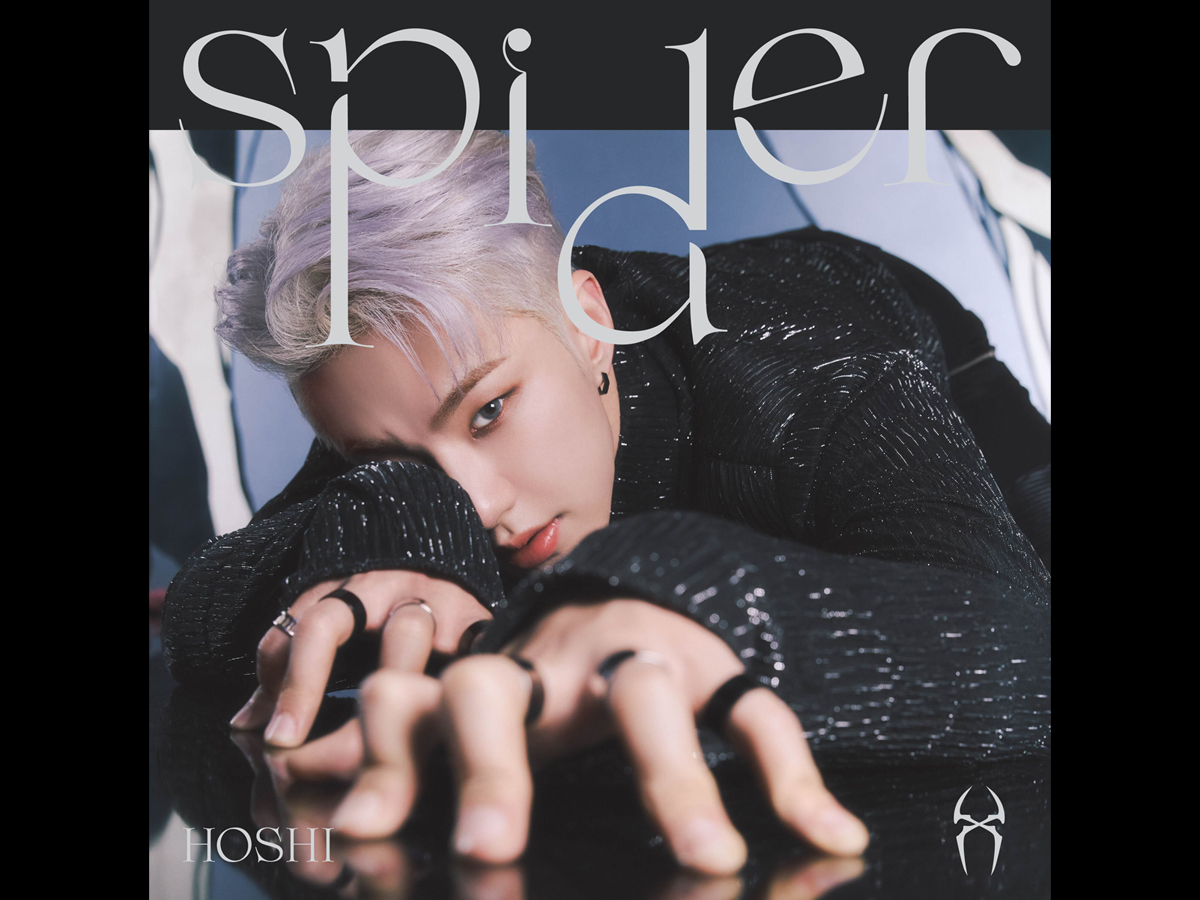
- Did you listen to the new album?2020.10.20
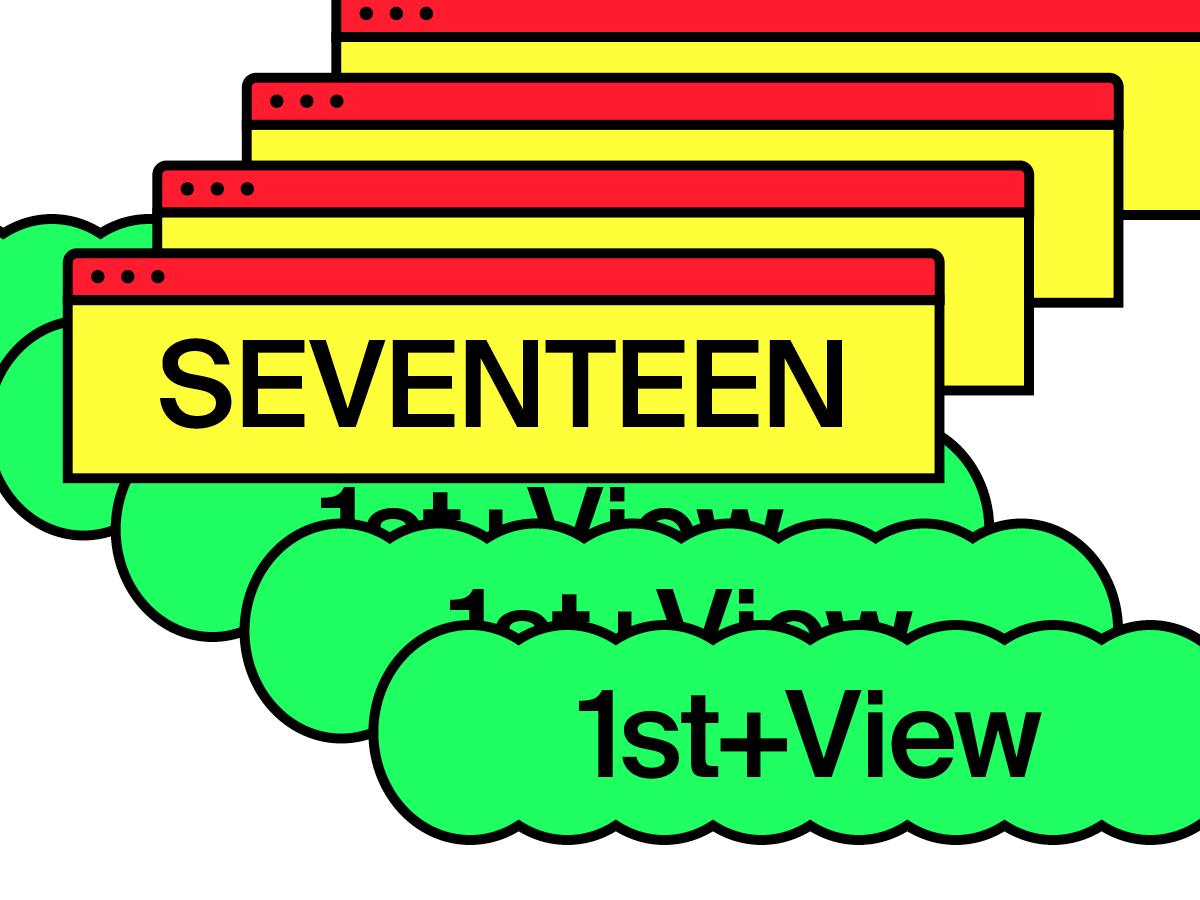
- 2020 SEVENTEEN’s performance2020.12.30
